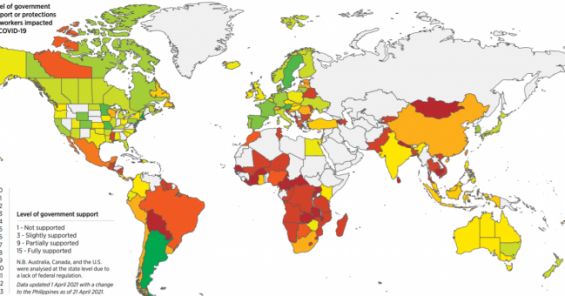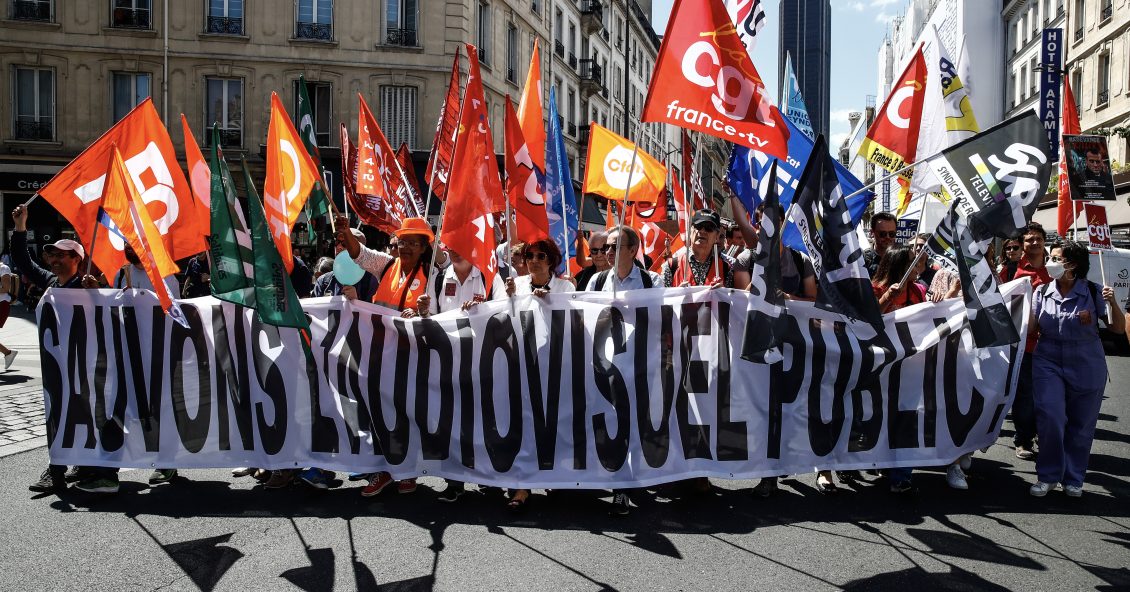A from UNI Global Union and the International Trade Union Confederation (ITUC) has found that 98 per cent of the world’s workers are not getting the sick pay, wage replacement and social benefits they need to withstand the impacts of COVID-19.
The report, COVID-19: An Occupational Disease – Where frontline workers are best protected, analysed and ranked the levels of worker compensation, social security programmes and public health systems in 181 national and regional jurisdictions. This included 124 countries, as well as 37 US states, 13 Canadian provinces and territories, and seven Australian states.
The top five countries in the report were Argentina, followed by Austria, Sweden, France, and Spain.
The overall top ten rated jurisdictions in the study, which included Argentina, Massachusetts, New Hampshire and New Jersey, provide the best support for workers affected by COVID-19. However, these jurisdictions represent only 2 per cent of the world’s working population, leaving the vast majority of working people with limited provisions and benefits if they are affected by the virus.
Just over half (98 jurisdictions) recognize COVID-19 as an occupational disease through a formal regulatory process, enabling people who have contracted coronavirus at work access to social protections and entitlements—such as sick pay, medical care, and wage replacement—that would otherwise be denied. This recognition is particularly important for workers who suffer from long-COVID and other ongoing complications from the disease.
However, even where COVID-19 is recognized as an occupational disease, governments are often unjustly denying benefits because workers cannot prove they contracted the virus on the job. To remedy this problem, some jurisdictions (6 per cent of those examined) have adopted presumptive laws or policies, meaning the disease is assumed to have been contracted on the job. This critical step elevated these countries’ responses to the pandemic to the top of the ranking.
Christy Hoffman, UNI Global Union General Secretary, said:
“Governments are failing the frontline workers who are supporting our communities during the pandemic by forcing them to shoulder the physical, psychological and financial burdens of COVID-19 on their own. These workers—often women, migrants and workers of colour—should not have to choose between their personal health and financial health. Recognizing COVID-19 as an occupational disease combined with automatic qualification for benefits for workers on the frontlines will help ensure workers have the best possible chance of getting the benefits and compensation they deserve.”
Sharan Burrow, the ITUC’s General Secretary, said:
“We cannot let frontline workers fall through the cracks without social protection. A resilient recovery needs a new social contract, giving workers the best possible chance of getting the benefits and compensation they deserve, with a Global Fund for Social Protection as the first step towards universal rights. To do that, we call on the International Labour Organization to recognize COVID-19 as an occupational disease urgently, as part of the drive towards making occupational health and safety a fundamental right.”
Key findings:
- Only ten jurisdictions (5.5%) received top ratings indicating good or very good provisions for wage replacement, medical treatment, sick pay, and death benefits.
- Sick pay was available in 104 jurisdictions, meaning that almost 43% of workers had no access to paid sick leave.
- Only 6% of the studied jurisdictions had presumptive rules, regulations, laws or policies that give automatic access without proof to medical treatment and wage replacement for all workers. However, when considering healthcare workers this percentage rose to 17%.
- Argentina received the top score for a country, showing that strong support for workers does not depend on a nation’s wealth.
- In Germany and the Nordic countries, existing legislation on infectious diseases means that workers who contract COVID-19 have automatic access to sick leave, wage replacement and medical care. No formal change was needed to the legislation to support workers. They provide some of the best examples of how a country could prepare for future pandemics.
UNI Global Union and ITUC are making five key policy recommendations to ensure better support for frontline workers:
- Automatic qualification for benefits related to COVID-19 illness
- Coverage for all workers regardless of the employment relationship
- Reliable data collection
- Inclusion of a general occupational infectious disease category in laws and policy
- Paid sick leave for testing and recovery
UNI Global Union represents 20 million workers in skills and services in over 150 countries, including two million workers in care.
The International Trade Union Confederation (ITUC) is a confederation of national trade union centres, each of which links trade unions of that particular country. It has 332 affiliated organisations in 163 countries and territories on all five continents, with a membership of 200 million.


